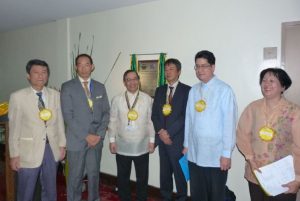NEWS AND UPDATES
LepCon, brings leptospirosis R&D in the Philippines to another level

With the attention that the leptospirosis outbreak in Mindanao is getting from the media lately, it seems impossible to believe that it is among the many illnesses that are often ignored around the world. One would only think about the lives lost due to leptospirosis on the aftermaths of typhoons Ondoy and Sendong, in order to picture how scary it must be to be afflicted with this deadly disease. Yet, the World Health Organization (WHO) includes it in its list of Neglected Global Diseases.
Dr. Takeshi Kasai, Director of the Division of Health Securities and Emergency of the World Health Organization (WHO), explained, We know leptospirosis is not a small public health problem in our region; yet it is a neglected disease. Even from the WHO list of Neglected Global Diseases, it is included. It has not received any attention except during the outbreaks.
Hence, the inauguration of LepCon Laboratory at the Lara Hall at the University of the Philippines Manila – College of Public Health (UPM-CPH) on January 26, 2012, will help build better understanding on the nature of the disease through leptospirosis R&D.
LepCon or the Prevention and Control of Leptospirosis in the Philippines was started by the UPM-CPH on April 1, 2010 in partnership with the Japan International Cooperation Agency (JICA), Philippine Council for Health Research and Development of the Department of Science and Technology (PCHRD-DOST), Kyushu University (KU) and the World Health Organization (WHO). The creation of the LepCon laboratory is just one of the many steps that the collaboration made in order to bring about better understanding on the cure and prevention of leptospirosis. So far, studies on the identification of serovars, prevention and control of outbreaks and even creation of vaccines that could help treat the disease are all making breakthroughs through the combined efforts of researches in the UPM-CPH and KU.
The plight of many people affected by leptospirosis is a sad reality that Dr. Kasai had personally seen. He understands that even though only a few researchers are engaging in leptospirosis R&D, the recent advancements in the LepCon program shows a glint of hope in the fight against this lethal, but often ignored, disease.
When Ondoy came to this country a few years ago, we were faced with a very sad reality, a reality that many lives suffered because of a neglected disease, he said. However, he expressed his optimism as he explained, “I’m sure that with the development of this new research program on the prevention and control of leptospirosis in the Philippines, will enter a new stage in addressing leptospirosis.




